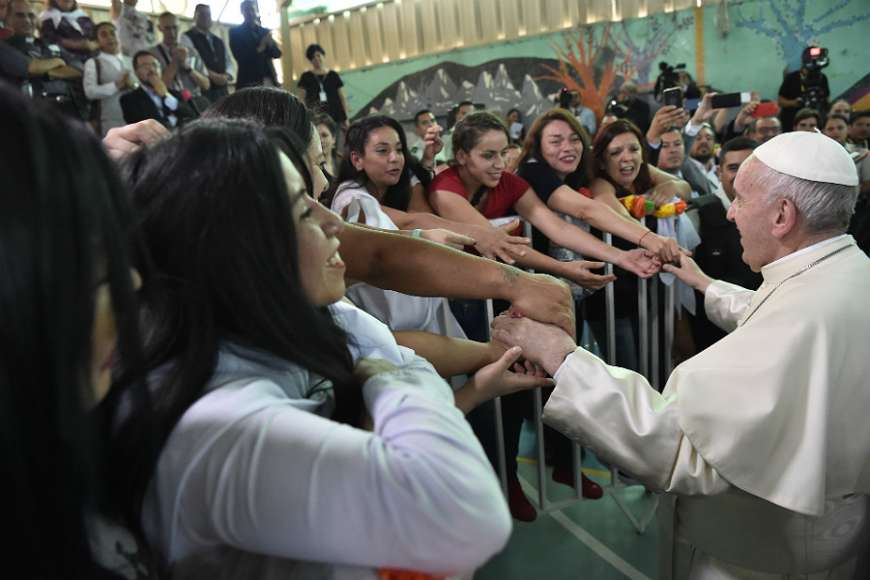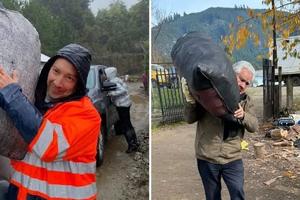Pope to Women at Chile Prison: Build a Better Future
‘Motherhood is … one of the most wonderful gifts you can ever have,’ he told the inmates who are mothers.

SANTIAGO, Chile — Pope Francis visited a women’s prison in Santiago on Tuesday, telling the inmates that while at times it might seem like they have no future, they must never stop dreaming and should look for opportunities for personal growth.
“Losing our freedom does not mean losing our dreams and hopes. Losing our freedom is not the same thing as losing our dignity,” the Pope said Jan. 16.
Because of this, he stressed the need to reject all of the “petty clichés” that tell us “we can’t change, that it’s not worth trying, that nothing will make a difference.”
“No, dear sisters! Some things do make a difference,” he said. “All those efforts we make to build for a better future — even if often it seems they just go down the drain — all of them will surely bear fruit and be rewarded.”
Pope Francis spoke to inmates at the San Joaquin women’s prison in Santiago, which was founded by religious sisters from the Congregation of the Good Shepherd.
Established in 1864 and entrusted to the sisters in 1996, the prison until 1980 had no more than 160 inmates. However, with the increase in drug trafficking and the use of narcotics, by 2000 the prison had around 1,400 inmates.
Today the prison, which has 885 spaces available, houses nearly 45% of all female inmates in Chile.
Francis visited the prison on his first full day in Santiago, which is part of his visit to Chile. He gave the penitentiary a ceramic bas-relief of Our Lady from Italy.
During the encounter, he heard the testimony of Sister Nelly León, who is in charge of pastoral outreach in the prison and who lamented that the poor are disproportionately incarcerated in Chile.
He also listened to one of the inmates, Janeth Zurita, who asked forgiveness of those who have been harmed by the wrongs the imprisoned have done and spoke about the suffering of the children of inmates. “May God have mercy on all the children whose parents are prisoners, because they have a punishment we gave them, without willing it,” she said. Zurita also asked that “we may be able to repay our debt to society without being separated from our children.”
In his address, the Pope thanked Zurita for “coming forward and sharing your hurt with all of us, and for your courageous request for forgiveness.”
“How much we all have to learn from your act of courage and humility,” he said, and he also thanked Zurita for her words on forgiveness, which serve as a reminder “that without this attitude we lose our humanity.”
He noted how many of the women at the prison are mothers and therefore know what it means to take on a new life and bring it into the world.
“Motherhood is not, and never will be, a problem. It is a gift and one of the most wonderful gifts you can ever have,” he said, noting that in their position, the women face the very real and unique challenge of caring for the life they have created.
“You are asked to care for the future, to make it grow and to help it to develop,” he said, adding that, as women, “you have an incredible ability to adapt to new circumstances and move forward.”
Children themselves are a source of strength and incentive for the future, he said, explaining that their presence is also a reminder that life must be lived for the future and not stuck in the past.
“Today your freedom has been taken away, but that is not the last word — not at all,” he said, and he told the women to “keep looking forward. Look ahead to the day when you will return to life in society.”
Pointing to the Gospel passage in Mark in which Christ is laughed at for saying the daughter of a synagogue leader was not dead but merely asleep, the Pope said Christ “pays no attention to ridicule and never gives up,” but takes our hand and tells us to get up, just as he did for the little girl.
Sadly, he noted that a jail sentence can seem like just a punishment with no opportunities for personal growth. “This is not good,” he said, explaining that initiatives aimed at job training and the restoration of relationships are “signs of hope for the future.”
“Let us help them to grow,” he said, adding that “public order must not be reduced to stronger security measures, but should be concerned primarily with preventive measures, such as work, education and greater community involvement.”
Francis closed his address by saying life itself blooms and shows its beauty when we work hand-in-hand to make things better and open the door to “open up new possibilities.”
He greeted all those who work and volunteer at the prison, who carry out “sensitive and complex” tasks. He also spoke to the authorities at the prison, asking them to provide “the conditions needed to carry out your work with dignity, a dignity that engenders dignity.”
- Keywords:
- chile
- pope francis
- pope in chile

















